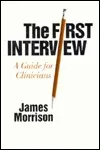The First Interview: A Guide for Clinicians
By (author): "James R. Morrison"
Publish Date:
1993
ISBN0898629926
ISBN139780898629927
AsinThe First Interview: A Guide for Clinicians
Original titleThe First Interview: Revised for DSM-IV
Rewritten to incorporate the new DSM criteria, The First Interview updates a text that is rapidly becoming a standard in the field. This timely, accessible volume covers a broad range of personalities and problems typically encountered in the first interview, offering fresh insight on how to elicit key diagnostic details from even the most challenging patient. Completely up to date, all references to DSM-III-R have been revised, and outlines of the most common diagnoses have been rewritten in accordance with the new criteria. The First Interview specifies what you need to ask, and how best to frame your questions. Presented in a conversational, forthright style, these techniques are further brought to life by illustrative clinical vignettes. The author takes you through each stage of an interview, demonstrating how to derive maximum information while establishing and maintaining trust and rapport. Effective verbal and nonverbal communication skills are emphasized, with techniques provided to help draw out feelings and determine symptoms, mental status, family background, personal strengths, and vulnerabilities such as a history of violence or childhood abuse. The volume concludes with a detailed discussion of how clinicians can most effectively present findings and recommendations to patients and their families in a manner that offers information with a sense of trust and hope. Clinically useful appendices include a sample interview and written report, DSM-IV diagnoses in abbreviated form for easy reference, standards for scoring the initial interview, and a list of recommended readings. For the seasoned clinician, this new edition of The First Interview provides a refresher course on the initial interview, and alternative approaches for interviewing difficult patients. It is also an ideal introductory text for students in psychology, psychiatry, social work, pastoral counseling, medicine, and nursing.
